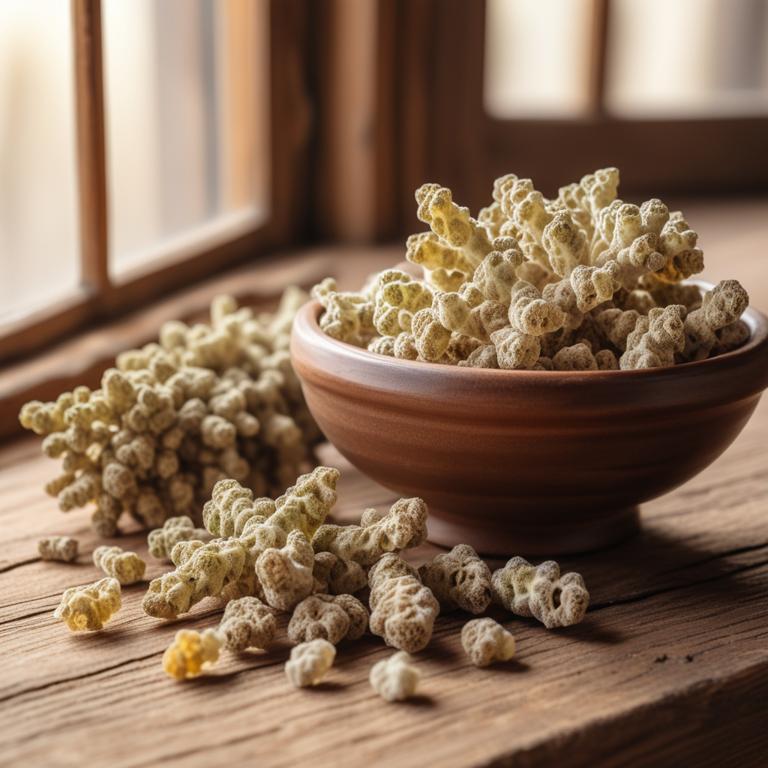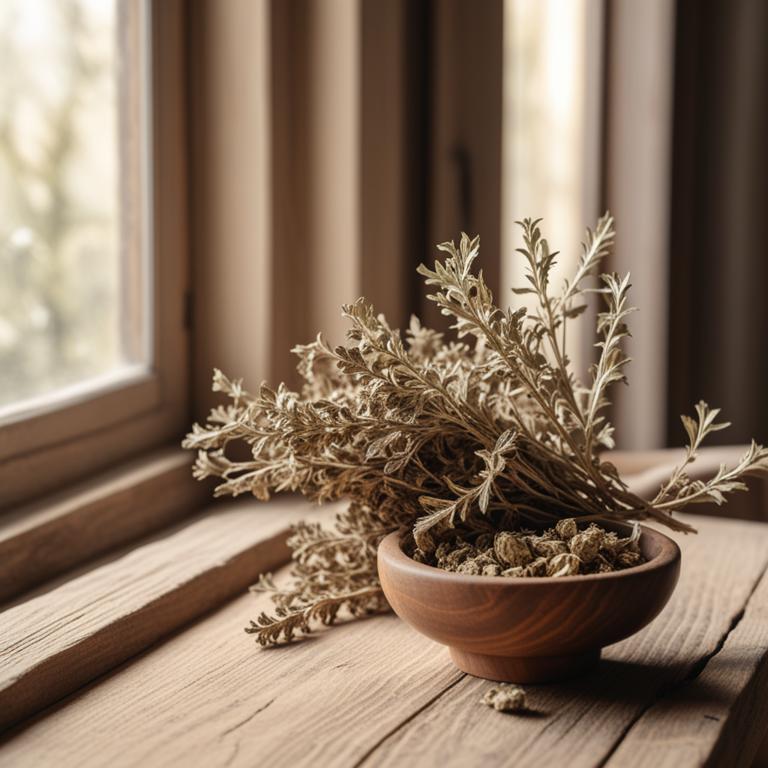Updated: Dec 1, 2024
Understanding Lower Back Pain: Causes, Medicinal Herbs, and Herbal Preparations
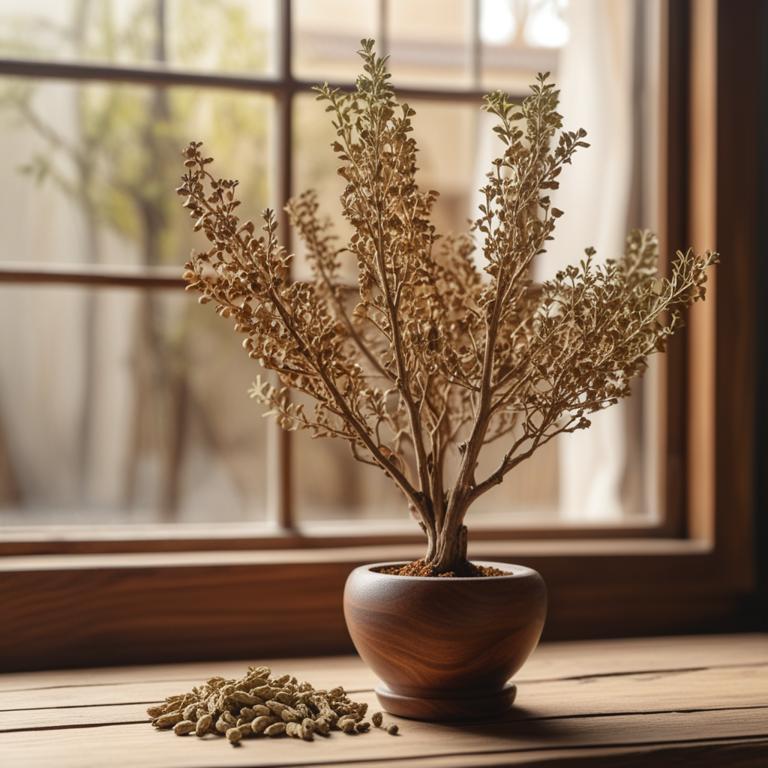
Lower back pain is a common problem that affects millions of people worldwide.
It can make everyday tasks like getting out of bed or even walking feel like a chore. The pain can range from a dull ache to a sharp stabbing sensation, making it hard to concentrate and enjoy life. So, what causes lower back pain?. Often, it's due to overuse or strain on the muscles and joints, which can be triggered by lifting heavy objects, bending, or even sitting for long periods. Poor posture, being overweight, or even a medical condition like arthritis can also contribute to the problem.
Fortunately, there are some natural remedies that can help alleviate lower back pain. Herbs like turmeric, ginger, and willow bark contain anti-inflammatory compounds that can reduce swelling and ease pain. These herbs can be consumed as teas, capsules, or even added to food. Turmeric tea, for example, is made by steeping turmeric roots in hot water, while ginger can be dried and made into a tea or added to soups and stews. Willow bark tea, on the other hand, contains salicin, a compound similar to aspirin that can help reduce pain and inflammation.
By incorporating these herbal remedies into your daily routine, you may find some relief from lower back pain and be able to enjoy life again.
Table of Contents
- What factors lead to lower back pain?
- What are the benefits of using herbs to alleviate lower back pain?
- What are the most commonly used medical herbs for lower back pain management?
- What are the most effective herbal treatments for lower back pain?
- Which herbs are best avoided if you have lower back pain?
- FAQ
What factors lead to lower back pain?
The main causes of lower back pain are several conditions that put pressure on the muscles and bones in the lower back.
One common cause is a herniated disc, where the soft inner part of the spinal disc pushes through the outer layer, irritating nearby nerves and causing pain. This can happen when the disc wears down over time or due to injury. Another cause is scoliosis, a condition where the spine curves abnormally, putting uneven pressure on the muscles and bones.
This can be caused by genetics, poor posture, or muscle imbalances. Spinal stenosis is a condition where the spinal canal narrows, compressing the nerves and causing pain. This can be caused by wear and tear on the spine over time, or by conditions such as arthritis or spondylolisthesis. Spondylolisthesis is a condition where one of the vertebrae slips out of place and puts pressure on the surrounding nerves and muscles.
This can be caused by a birth defect, wear and tear on the spine, or a sudden injury.
What are the benefits of using herbs to alleviate lower back pain?
Using herbs for lower back pain can be very helpful.
They can reduce pain and inflammation in the muscles and joints. Some herbs have anti-inflammatory properties, which means they can fight off the swelling and discomfort that comes with back pain. Others have pain-relieving properties, which can help take away the sharp or dull ache in your back.
Herbs can also improve circulation, which helps bring oxygen and nutrients to the affected areas, promoting healing and reducing pain. Some herbs even have a sedative effect, which can help with sleep and relaxation, making it easier to manage back pain. Additionally, herbs can be used as a natural alternative to medications, which can have side effects and interact with other medications.
They can also be used in combination with other therapies, such as exercise and physical therapy, to get the best results.
What are the most commonly used medical herbs for lower back pain management?
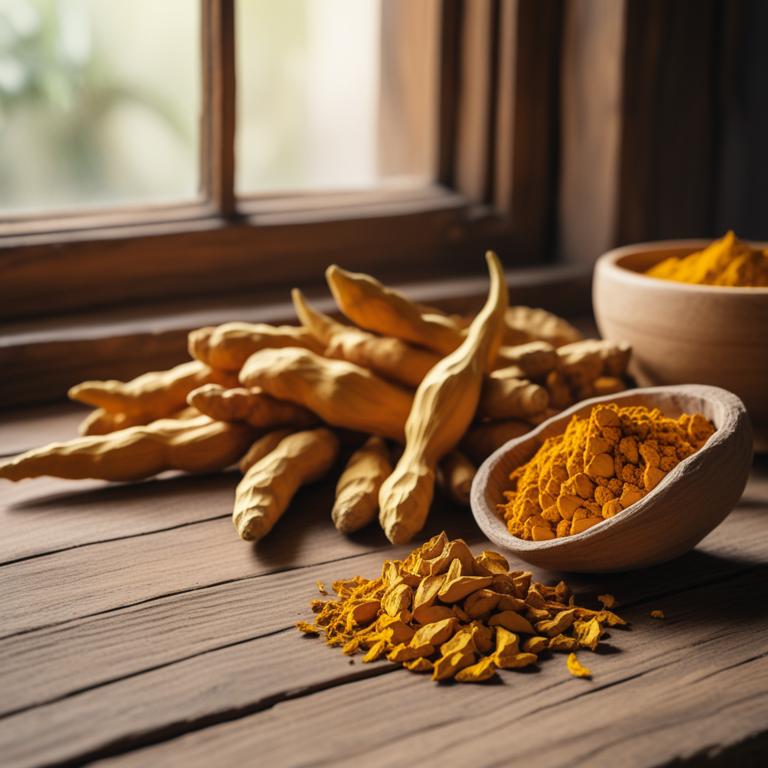
If you're experiencing lower back pain, you might want to consider trying some herbs that have anti-inflammatory and pain-relieving properties.
One of them is Curcuma longa, or turmeric, which contains a compound called curcumin that reduces inflammation and blocks pain signals. Another herb, Zingiber officinale, or ginger, also has anti-inflammatory properties and is often used to ease muscle and joint pain.
Cinnamomum verum, or cinnamon, has a compound called cinnamaldehyde that has a similar effect to curcumin and can help reduce pain and inflammation. Licorice root, or Glycyrrhiza glabra, has anti-inflammatory compounds that can help reduce pain and swelling. Finally, Salvia miltiorrhiza, or Chinese sage, contains a compound called tanshinone that has anti-inflammatory properties and can help improve blood flow to the muscles, which can help reduce pain and stiffness.
These herbs can be consumed as teas, capsules, or added to food, and can be a natural and effective way to manage lower back pain.
What are the most effective herbal treatments for lower back pain?

When it comes to lower back pain, herbal preparations can be a great option to consider.
A decoction is a liquid mixture made by boiling herbs in water, which helps to release their active ingredients. This makes it easy to absorb and use the herbs' healing properties. For example, decoctions of ginger and turmeric have anti-inflammatory properties that can help to reduce pain and swelling in the lower back. Herbal capsules are another popular choice. They contain a concentrated dose of dried herbs that can be easily swallowed and absorbed by the body. Capsules made from herbs like willow bark and meadowsweet contain salicylic acid, which is similar to aspirin and can help to reduce pain and inflammation. Tinctures are liquid extracts of herbs that are made by soaking them in a solvent like vodka or glycerin.
They're usually taken in small amounts, but can be very potent. Tinctures of herbs like valerian root and passionflower can help to relax the muscles and reduce anxiety, which can contribute to lower back pain. Infusions are similar to decoctions, but are made by steeping herbs in hot water rather than boiling them. This helps to preserve the herbs' delicate properties and makes them easier to digest. Infusions of herbs like chamomile and lavender can help to calm the mind and body, reducing stress and tension that can contribute to lower back pain. Finally, herbal creams can be applied directly to the lower back to provide targeted relief. These creams typically contain a combination of herbs and other natural ingredients that can help to reduce pain and inflammation. For example, creams made from arnica and peppermint can help to numb the area and reduce discomfort.
It's worth noting that herbal preparations can interact with certain medications or have side effects, so it's always a good idea to talk to a healthcare professional before trying them.
Additional Resources:
- 7 herbal teas for lower back pain
- 7 herbal tinctures for lower back pain
- 11 herbal creams for lower back pain
Which herbs are best avoided if you have lower back pain?
If you have lower back pain, it's best to steer clear of Aconitum carmichaelii.
This herb, also known as Chinese aconite, contains toxic compounds that can cause more harm than relief. Its active ingredients can increase pain sensitivity, making your lower back pain feel worse, not better. Similarly, Ephedra sinica, or Chinese ephedra, should be avoided due to its potential to irritate the nervous system and increase blood pressure. This can exacerbate lower back pain and even lead to cardiovascular issues. If you're experiencing lower back pain, it's best to opt for gentler herbs.
Some herbs, like Valeriana officinalis or valerian root, may seem like a natural remedy for pain, but it can actually worsen lower back problems in certain individuals. Valerian root can slow down muscle contractions, which might be beneficial for some, but it can also lead to muscle weakness and stiffness in others. Angelica archangelica, or European angelica, contains compounds that can thin the blood and interfere with blood clotting. If you have lower back pain, you may want to avoid this herb as it can increase the risk of bleeding or bruising, especially if you're taking any blood-thinning medications. Lastly, Paeonia lactiflora, or peony root, may not be suitable for those with lower back pain due to its potential to slow down blood flow and increase inflammation in the body.
This can worsen lower back pain and make it harder to recover.
FAQ
Are there any specific herbs that can prevent lower back pain?
Turmeric and ginger have anti-inflammatory properties that may help reduce lower back pain.
These herbs can be consumed as teas or added to meals. Ginger also helps relax muscles, which can ease tension in the back.
Some people find that using turmeric and ginger can make a big difference in their lower back pain.
Is it safe to use herbal remedies for lower back pain during pregnancy?
Using herbal remedies for lower back pain during pregnancy can be tricky.
Some herbs may help, but others can harm the unborn baby. For example, willow bark and feverfew can cause bleeding, and pennyroyal can harm the baby's liver.
It's best to be careful and research the herbs before using them.
Are there any herbs that can reduce the frequency of lower back pain?
Turmeric is a common herb that may help reduce lower back pain.
It contains a compound called curcumin, which has anti-inflammatory properties that can ease pain and discomfort.
Ginger is another herb that can help alleviate back pain by reducing inflammation and improving blood flow to the affected area.
Related Articles
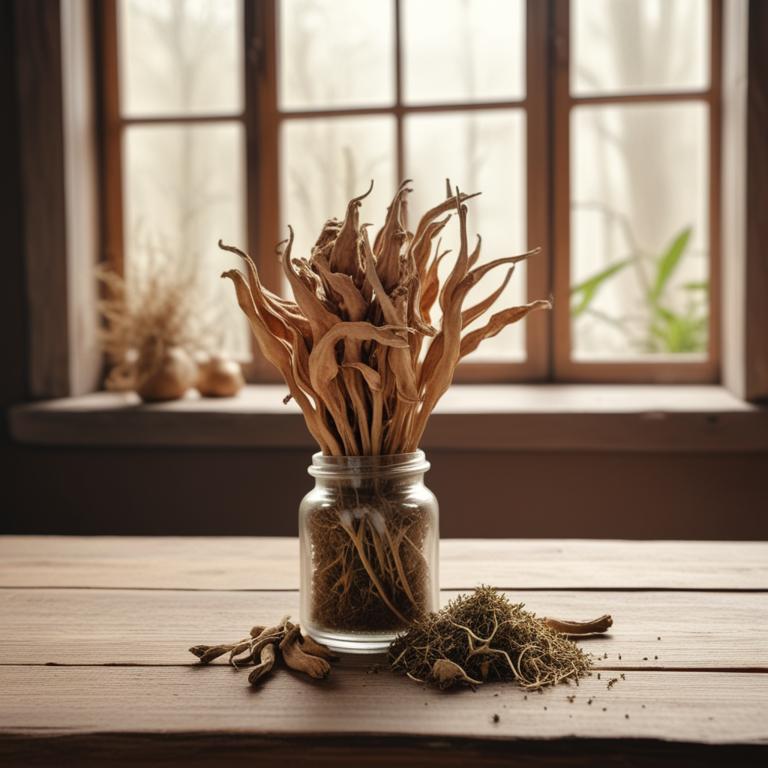
Tendinitis Relief: Exploring Medicinal Herbs and Their Preparations
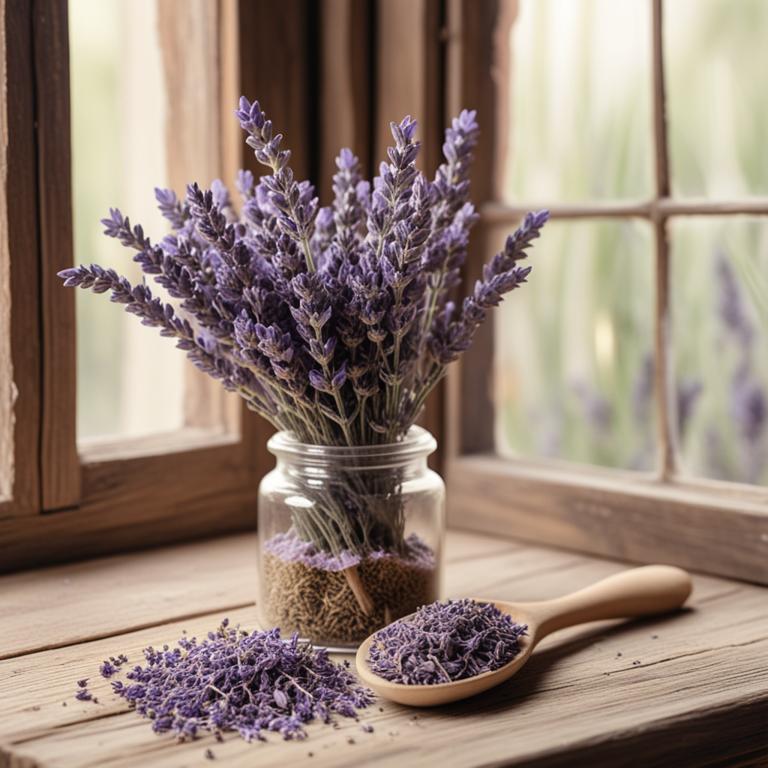
Jaw Clenching and Bruxism: Causes, Medicinal Herbs, and Herbal Preparations

Understanding Bunion Causes and Using Medicinal Herbs for Relief
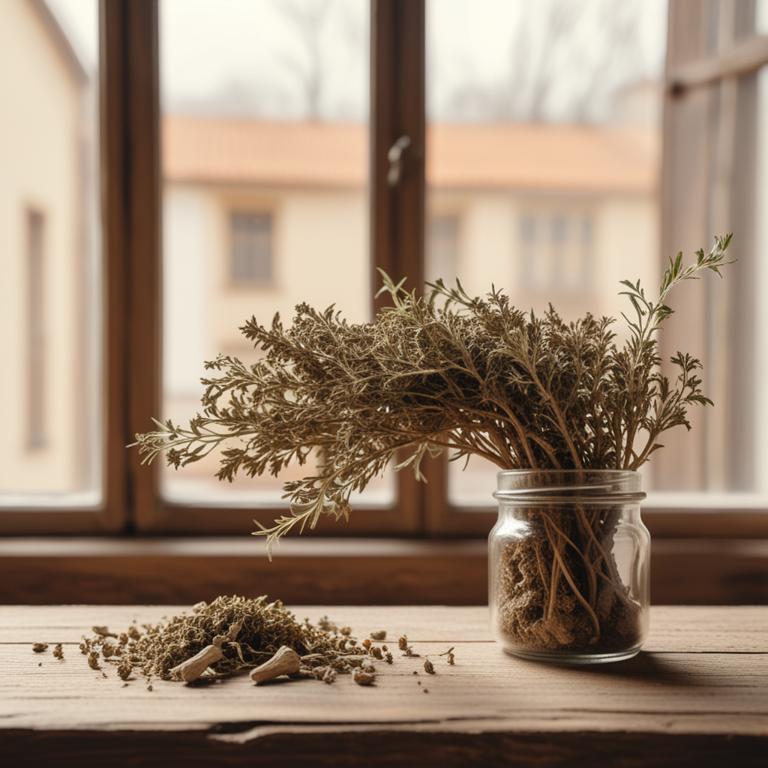
Natural Remedies for Leg Pain: Causes and Herbal Preparations
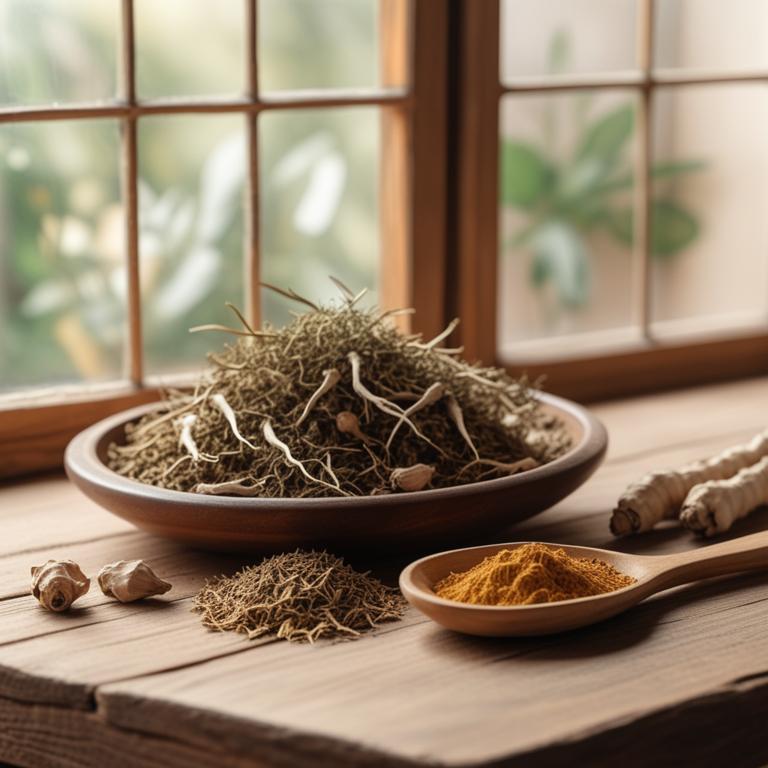
Knee Swelling: A Guide to Medicinal Herbs and Natural Preparations





